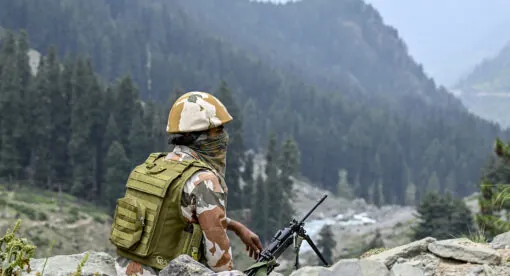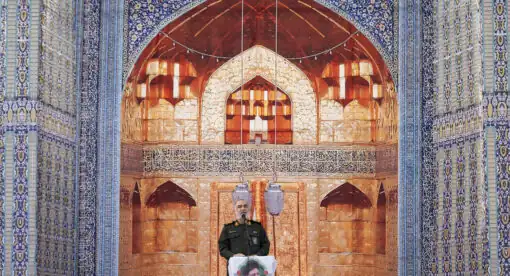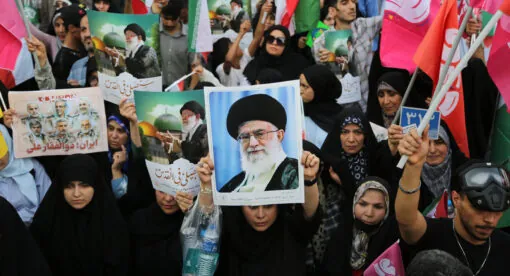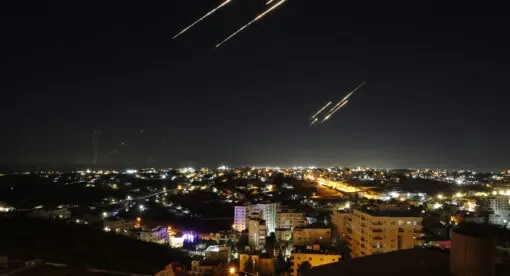In the latest Contours episode, host Carolyn Moorman is joined by New Lines Senior Analyst Riley Moeder to discuss Egypt’s strategic calculus given the beginning of the Israel-Hamas war in October 2023 and the ongoing Sudanese conflict.
Carolyn Moorman:
Hello and welcome to the Contours Podcast by the New Lines Institute for Strategy and Policy. This is your host, Carolyn Moorman, and today we’ll be honing into Egypt and how the ramifications of both the Israel-Hamas and the Sudanese conflicts are affecting Cairo. I’m joined by New Lines’ Riley Moeder. Riley is a senior analyst for the Special Initiatives Program, focusing her research on North Africa and strategic rivalries. Prior to joining the institute, Riley was a program assistant for the United States Institute of Peace in the Middle East and North Africa department. She also previously worked at the American Enterprise Institute in the Critical Threats Project researching non-state actors in the Sahel. Riley, thank you so much for joining me. I’d like to get started with the Israel-Hamas conflict, as this is going through everyone’s mind right now. In a previous episode of Contours, I sat down with New Lines’ senior analyst, Calvin Wilder to discuss the actual conflict, but I’d love to get your take on where this is headed and Egypt’s role in all of this.
Riley Moeder:
Thanks, Carolyn. It’s a very tragic set of events that are unfolding that has a potential to turn into a major regional conflict that could have metastasizing effects across the world. I think right now the most important thing is providing a humanitarian pause to civilians and getting them safe passage out of the Gaza Strip and getting much needed aid into the Gaza Strip. As of November 7th, AP News estimated that just over 10,000 people have been killed, 4,000 of them being children in Gaza, and in Israel about 1,400 people have been killed, making this need for a humanitarian pause much more important. Egypt’s Sinai Peninsula shares a border with the Gaza Strip, and right now it’s one of the only entry points for humanitarian assistance and exits for refugees outside of Gaza. As of right now, the border is not open and very limited aid is getting through, leaving refugees trapped as well as trapping aid workers on the other side.
Carolyn Moorman:
Speaking about this humanitarian situation and this potential of refugee flows, after Hamas’ attack on Israel on October 7th, the Israeli government has of course reacted by conducting a very powerful bombing campaign with the stated objective of destroying Hamas. This has caused massive civilian casualties in Gaza, and as you were talking about this, blockade currently limits all the energy, water, food, and humanitarian supplies going in and out of Gaza, as well as the movement of Palestinians. We have seen some breakthroughs of American citizens and other foreign nationals being able to get out of Gaza, but this has not limited the rumors that the end goal of the Israeli government here is to force Palestinians to flee to Egypt or to clear out land for the expanded Israeli state. As I’m sure you’ll go into, Egypt is currently dealing with a lot of different problems from multiple different points, including the Sudanese conflict. So I’m wondering how has Egypt been reacting to this situation and particularly the potential of refugee flows to the Egyptian state?
Riley Moeder:
I think we can agree, and I know we’ll get into this probably later in the podcast, but Egypt has had a rough year when it comes to refugees and accepting refugees into their country, so they’re very torn. Obviously, the Egyptian government and President El-Sisi have put out several statements in the last couple of weeks, stating that they want to prevent any further displacement and further disenfranchisement that may affect the Palestinian people. But they’re also very concerned about the instability in Sinai, particularly Northern Sinai, which still has pockets of ISIS and Al-Qaeda affiliates, and they’re worried about what the potential destabilization in this region may mean for the return of violent extremist groups operating in the area. As of now, there’s not a massive amount of refugees crossing or a significant amount of aid entering through this border city of Rafah, despite having aid workers and supplies on the border ready to go.
Egypt is also currently dealing with a record high inflation, a failing economy, and is grappling with refugee crisis already in the south of Sudan. So all of these things compiling on top of each other is really putting a massive strain on Egypt. That being said though, Egypt is in a unique position where they’re also hosting several international organizations such as Med Global, which are on the border and slowly starting to get trucks across. But yeah, Egypt is not necessarily willing to accept refugees at this time, but I think there may not be a choice moving forward.
Carolyn Moorman:
So you’ve mentioned it, I’ve mentioned it, but turning now to Sudan more officially, you’ve been on previous Contours episodes to discuss this conflict and the ramifications for surrounding countries such as Egypt. Can you give us an update about where we are right now with the fighting and how the peace talks in Jeddah are going? Are we seeing any kind of lasting ceasefire between the RSF and the SAF, or is this just a continuation of more fighting and more instability for Sudan?
Riley Moeder:
Yeah, so let’s break this down because there’s a couple elements to this question, right? There’s the peace talks in Jeddah, and then there’s what’s happening in the country. So no, we are not closer to any kind of permanent ceasefire or any kind of temporary ceasefire through the peace talks in Jeddah. Though they’ve resumed, it’s really unlikely that they’re going to be successful. There’s really no backbone to these conversations, and there’s really no motivation for either group to stop fighting at this time. So right now, the situation in Sudan is quite dire, with a full on genocide happening in Darfur. This is unfortunately a conflict that seems right now like it’s neverending and is only going to get worse as time goes by. Just kind of breaking down some of the numbers that I just mentioned, of the 4 million displaced, tying this back to Egypt, more than 300,000 have crossed the border into Egypt.
80% of hospitals are out of service in Sudan, the MSF or Doctors Without Borders being kind of at this point being ready to pull out of the last operating hospital in Darfur. And this also comes at a time when the Russians are getting involved. So the Wagner Group has been infamous throughout Africa, and they’re currently active in Sudan providing assistance to the RSF with hacking campaigns, taking out power grids, providing weapons, supplies and fighters, as well as kind of overall operational support, which is making this an increasingly more dangerous situation, and one that I think we should be paying more attention to, especially with how this will play out with other conflicts and other refugee crises within the region.
Carolyn Moorman:
And you also, in another Contours episode, talked about how refugees are being treated in Jordan. And so continuing on the Sudan route, how have these Sudanese refugees and also how do you think potential Palestinian refugees would be treated in Egypt? Does Egypt have long-term plans to deal with these massive populations of refugees, or are they just putting a lot of hope into the repatriation of refugees and hoping that that happens and leaving it at that right now?
Riley Moeder:
It’s an interesting question. Looking at how refugees are treated in Egypt, I think we can look at the southern border with Sudan and how they’re being affected there, and just some basic statistics, which are, 32% of the Egyptians currently live between the national poverty line, and according to the UN Refugee Agency, the percentage is even higher for refugees, about 84%. Access to basic services such as healthcare and education is extremely challenging for refugee and asylum seekers because of linguistical barriers, harassment and discrimination, which further limits their access to formal education and contributes to marginalization. Egypt in particular does not have any sort of long-term capacity for refugees. Just looking directly back at their economy, they are in one of the most highest inflations they’ve been in a long time. There’s not any additional resources to provide for these refugees, and I think this is where the international community can come in and really step up here, looking at different ways to support both the Egyptian government and providing for these refugees, but also encouraging other groups to take in refugees as well.
In terms of return, in Sudan, there’s not really anything to return to right now, which is very sad. There is an active war, an active genocide, and once you are out and into another country, they’re not just fleeing to Egypt. They’re fleeing to Chad, Central African Republic, to other neighboring countries. I’m sure if it was stable, people might want to return, but it’s not. And in terms of Egypt dealing with the Palestinian refugees, they will probably not return, which is quite tragic at this point. I mean, something that the refugees have to deal with on a daily basis. So it’s a very, very complex and very, very sad situation.
Carolyn Moorman:
So in this last response you mentioned providing Egypt with humanitarian aid by the US and the international community is really important right now, because as we know, they’re hosting this massive population. They could be hosting more if this Israel-Hamas conflict continues. Are there any other things the US can be doing right now to aid Egypt? It’s probable that if we ask the Egyptian government, they would probably encourage the US not to give Israel the green light to do whatever it’s doing in Gaza because it has the potential to send this massive population. But what other steps can the US and the international community be doing to help Egypt with this right now?
Riley Moeder:
In my personal opinion, we need to depoliticize it at this point, understanding that this is probably one of the most political conflicts going on in the world right now, and we need to prioritize civilian life on both sides. So this includes supporting cross-border aid mechanisms, allowing for the UN and international community to set up refugee camps within the border regions to get people, specifically women and children, and civilians who are being unfortunately caught in these massive bombing campaigns out of the Gaza Strip. Israel is targeting areas where they think Hamas may be present, and as part of their defense and part of their strategy. However, with that, they’re also leveling apartment buildings. And so right now, the international community needs to focus on the civilians. It needs to focus on getting people out in a safe capacity where they can receive the medical aid, the food aid, the relocation aid that they need. Until that happens, we’re just going to see the death count continue to grow.
Carolyn Moorman:
Absolutely, and I think I speak for everyone that we will be watching how this plays out. I want to thank you Riley so much for coming on the podcast today and breaking this down for myself and our listeners, and we hope to see you again as this conflict and its ramifications continue to spread throughout the region and into neighboring countries such as Egypt. We hope that you’ll come back onto Contours and update us. To our listeners, thank you so much for listening to the Contours Podcast. Please make sure to subscribe to anywhere that you listen to your podcasts, including SoundCloud, iTunes, Spotify, et cetera. You can also check out further analysis by Riley and other great analysts at the New Lines Institute at www.newlinesinstitute.org. Thank you for listening and all the best.
Editor’s Note: An earlier version of this podcast included a statement that 14,000 Israelis were killed in the Oct. 7 attacks. The intended statement was that 1,400 were killed. The correction has been made to the audio and transcript. (Jan. 4, 2024)






